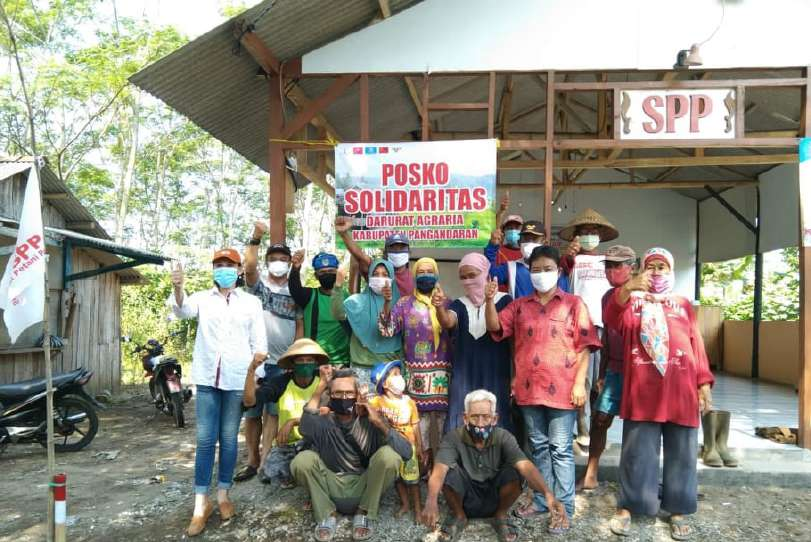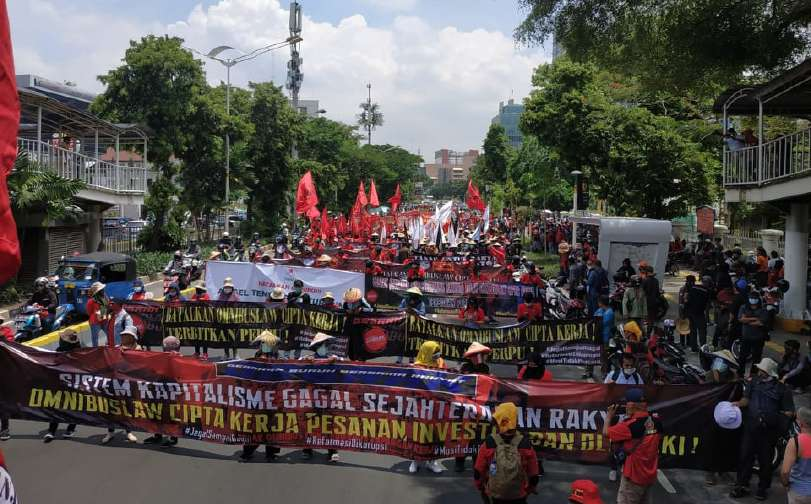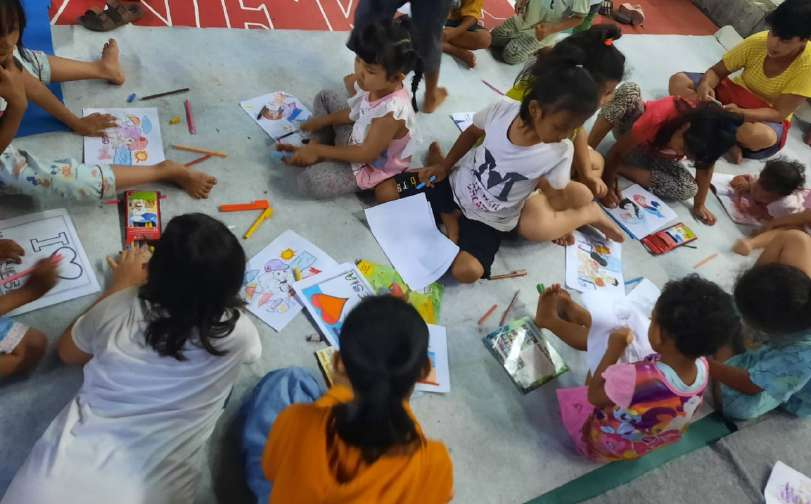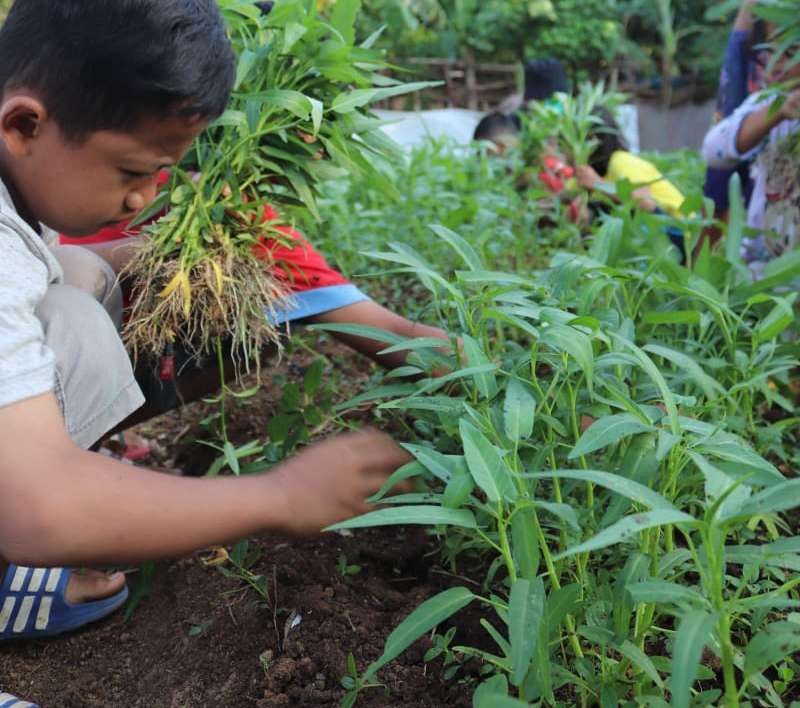The Konfederasi Pergerakan Rakyat Indonesia (KPRI) or Confederation of Indonesia Peoples Movement is a national organisation consisting of federations of women, workers, peasants, fisherfolk, indigenous people, and urban poor. KPRI members consist of 70 unions or people’s organisations in 22 provinces and 125 districts and cities across Indonesia (UP CIDS, 2018).
| Authors | KPRI; UPCIDS AltDev |
|---|---|
| Topics | Social change, Social justice |
| Case Report | Volume 1: "Resilience in the Face of COVID-19" |
Brief description
The Konfederasi Pergerakan Rakyat Indonesia (KPRI) or Confederation of Indonesia Peoples Movement is a national organisation consisting of federations of women, workers, peasants, fisherfolk, indigenous people, and urban poor. KPRI members consist of 70 unions or people’s organisations in 22 provinces and 125 districts and cities across Indonesia (UP CIDS, 2018).
As a grassroots federation, KPRI is the institutional transformation of Perhimpunan Penggerak Advokasi Kerakyatan (PERGERAKAN), or People-Centered Advocacy Organisation for Social Justice. PERGERAKAN started organising themselves from 1999 to 2002 through a series of research studies, assessments, educational activities, and consolidation meetings at the national and regional levels. In 2003, PERGERAKAN was officially founded as a membership-based organisation and held its first Congress in 2005 at Bali, which was attended by CSOs, NGOs, and other social movement actors.
As an organisation, KPRI adheres to the concept of solidarity economy, where the supply chain is independent of the dictates of the global capitalist economy. Solidarity economy banks on the principles of people-centred development in which the primary stakeholders—marginalised and vulnerable populations—have power over the means and ends of production. Through this, ordinary people play an active role in shaping all dimensions of human life: economic, social, cultural, political, and environmental. It has the ability to take the best practices within the present system, such as efficiency and use of technology, and transform them to serve the welfare of the community based on the communities’ unique values and goals.
This is KPRI’s response to the continuing dominance of neoliberal capitalism in the 21st century that pervades not only the market but also the state. KPRI sees the importance of the solidarity economy as an alternative to capitalism as well as other authoritarian and state-dominated economic systems.
Process that led to the community being resilient (Pre-covid)
For many years now, KPRI has implemented projects and conducted research on economic solidarity and transformative social protection across Indonesia. These projects have been a part of KPRI’s work to organise and educate working people—on economy, politics, social issues, and culture—in order to achieve its vision of a just, egalitarian, and prosperous society. KPRI believes that mass organisations should realise their historical struggle and re-organise their resistance. It aims for the people to "consume what they produce and produce what they consume" (UP CIDS, 2018).
KPRI members have been striving towards solidarity economy through various alternative community projects and practices. These include alternative schools (that have an emphasis on agriculture and agrarian reform), credit unions and cooperatives, mangrove eco-tourism, community television channels, medical assistance and legal aid for the urban poor, street libraries, urban gardening and much more.
One of the significant factors that has made KPRI resilient and sustainable is their credit unions. By 2018, KPRI had around 1,500 members—who are all part of the working class and members of credit unions (UP CIDS, 2018). These unions aim to make members independent by providing opportunities to access credit that otherwise isn’t provided by the mainstream banking system. Each local credit union has established its own structure to ensure that organisational management is kept in place, even if it’s a small group of individuals.
A small number of KPRI’s peasant unions are small landholders engaged in coffee cultivation. In order to guarantee equitable prices, KPRI is also involved in packaging and fair-trade within the coffee value chain. Its coffee marketing is stationed in Kedai Kopi KaPe RI (or KaPe RI Coffee Shop), which are present in Jakarta and other cities.
How resilience that was established has helped during the pandemic
Indonesia has been one of the worst affected countries by COVID-19 in Southeast Asia. Yet, despite the government’s delayed and inefficient response, Indonesia’s grassroots communities have stepped up at the local level. Despite facing mobility restrictions in the middle of the pandemic, member organisations of KPRI worked tirelessly to secure food. According to Tadem et. al. (2020), "KPRI’s peasant federation Serikat Petani Pasundan (Pasundan Peasant Union) harvested their farm produce in Pasundan (West Java) and distributed freely a significant portion to KPRI members in Bandung. Meanwhile, KPRI’s community-owned coffee shop (Kedai Kopi KaPe RI) in Jakarta was temporarily closed and was transformed into a ‘central solidarity place’ for the relief operation and donation drive, and the production of naturally-made hand sanitisers that were freely shared with the community."
KPRI has worked towards producing protective health equipment, natural hand sanitisers (made with betel leaves and lime), face masks, and has also set up hand-washing facilities since communities were facing difficulties in accessing these items. The organisation’s members have built community kitchens, engaged with fundraising, and distributed essential amenities within the community.
In Central Jakarta, members of Komunitas Pemuda Pergerakan Petamburan and Tomang (Youth Movement Community) worked with the local residents towards ensuring food security and the welfare of children. Since many Indonesian children couldn’t return to school or join online classes, these young university students established a community library and a reading garden for the children.
Sastro (2021) also points towards a "planting movement", which refers to the increasing adoption of urban farming, family farming and community farming. Such a movement is also increasing the economic independence of these families and communities. As Sastro (2021) puts it, peoples’ movement during COVID-19 is revitalising a "culture of solidarity also known as Gotong Royong (mutual cooperation)."
With the second wave of COVID-19 hitting Indonesia in July 2021, the KPRI leadership, together with the member federations, has been discussing the possibility of building their own people’s hospital with the help of social movements. The Hapsari Federation (Women’s Federation) is active in producing herbal medicine to support health workers in Medan, North Sumatra. The Federasi Serikat Buruh Karya Utama or FSBKU (a federation of workers’ unions) in Lampung supplies liquid smoked herbal medicine to people who are COVID-19 positive (and in self-quarantine) in various regions.
Meanwhile, in the midst of the health and economic crisis, KPRI joined other marginalised communities in Indonesia to protest the passage of the Omnibus Law on Job Creation. This controversial new law is believed to have been railroaded in the absence of a comprehensive public consultation while peoples’ physical mobility was highly restricted. This policy has immediately ushered a nation-wide protest and demonstrated the capacity of KPRI to continue their political expressions of dissent despite rising COVID-19 cases and the government’s restrictions on social gatherings.
Apart from that, KPRI is also involved with Jamesta (Jaminan Pendapatan Dasar Semesta) which is a campaign about social protection in relation to Universal Basic Income (UBI) in Indonesia. It has done so with the understanding that such a social protection strategy could benefit many people in the face of COVID-19 and beyond. KPRI and others in the Jamesta network have started debates and discussions on UBI, alongside their work of strategising and building coalitions. They have also established teams for public campaigns by using their own language: Bahasa. They have written working and policy papers, and created jingles, posters, and short videos. The regular discussions have also explored the idea of organising a Peoples’ Assembly, the Jamesta Congress, and online action.
Lessons learnt
When the pandemic hit Indonesia, the government’s chaotic policies and slow response to the crisis ushered the continued transmission and spread of COVID-19. On the political economic side, the pandemic has also demonstrated how neoliboeral oligarchs have capitalised on COVID-19 by using (and even expanding) their businesses for their own interest. KPRI, through the practice and study of economic solidarity, remains steadfast in challenging the impacts of neoliberal capitalism. They continue to see the need for organising the unorganised as well as the consolidation of their organised members—which is crucial for the sustainability and resilience of the organisations they are building.
During COVID-19, the idea of economic solidarity has seen increasing acceptance by social movements in Indonesia. KPRI has continued to build (and practice) a solidarity network between unions of farmers, indigenous peoples, fisherfolk, labor unions, and the urban poor. The two main issues being focused on are health and food.
Learning from various failures and successes in practicing economic solidarity, KPRI realises that one of its weaknesses is the management of economic institutions or cooperatives. In the midst of COVID-19, KPRI took the initiative to hold a series of workshops and discussions about cooperatives. Participants who attended (online and offline) were cooperatives from various unions and communities, both the successful ones and the failures. From this learning process, KPRI has compiled an educational module for strengthening and forming union-based cooperatives or people's and community organisations.
All these efforts reflect that community-based education, localised governance, networking, regenerative and sustainable leadership, and democratised information and technology are the key elements that KPRI has developed in building towards a model for alternative development.
External references
Tadem, E. C. et. al. (2020). "Reinforcing people-to-people solidarities towards a regionalism from below: Alternatives from Southeast Asia amid COVID-19". University of the Philippines Center for Integrative and Development Studies (UP CIDS) Program on Alternative Development
Ma’ruf, A (2021). "Indonesian people movement confronting COVID-19 Challenge." Confederation Indonesia People Movement (KPRI). Koalisi JAMESTA
Ma’ruf, A. (2017). "Solidarity Economy and Transformatif Social Protection from, by, and for the Working People": Presented during the ASEAN Civil Society Conference, ASEAN Peoples‘ Forum, University of the Philippines, Diliman, Quezon City.
Ma’ruf, A. (2020)."Konfederasi Pergerakan Rakyat Indonesia on Social Solidarity Economy and Cross-border Economy": Presented during the ASEAN Civil Society Conference, ASEAN Peoples‘ Forum Convergence Space on Alternative Regionalism, October, 2020 [online].
Ma’ruf A. (2021) "Solidarity Economy Cross Border "people to people": Presented during the How to Build Public Support for Food Sovereignty and the Right to Food in Asia, Asia Regional Dialogue, July 27, 2021 [online].
UP CIDS. (2018). "Proceedings of the Conference on Alternatives in Southeast Asia : Rethinking Cross-border Regionalism." University of the Philippines Center for Integrative and Development Studies, [2020]. Accessed on 18-08-21.
Retrieved from https://cids.up.edu.ph/publications/proceedings/conference-alternatives-sea-2018/



